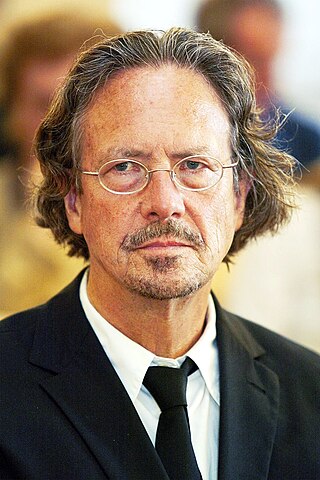
Peter Handke is an Austrian novelist, playwright, translator, poet, film director, and screenwriter. He was awarded the 2019 Nobel Prize in Literature "for an influential work that with linguistic ingenuity has explored the periphery and the specificity of human experience." Handke is considered to be one of the most influential and original German-language writers in the second half of the 20th century.

Yurii Ihorovych Andrukhovych is a Ukrainian prose writer, poet, essayist, and translator. His English pen name is Yuri Andrukhovych.
The Heinrich Mann Prize is an essay prize that has been awarded since 1953, first by the East German Academy of Arts, then by the Academy of Arts, Berlin. The prize, which comes with a €10,000 purse, is given annually on 27 March, Heinrich Mann's day of birth. The laureate is selected by an independent three-member jury which usually includes the previous year's laureate.

Max Herbert Eulenberg (1876–1949), was a German poet and author born in Cologne-Mülheim, Germany. He was married from 1904 to Hedda Eulenberg.

Kito Lorenc was a Sorbian writer, lyric poet and translator. He was a grandson of the writer and politician Jakub Lorenc-Zalěski.

Burkhard Hirsch was a German politician and civil liberties advocate. A member of the Free Democratic Party (FDP), Hirsch spent 21 years in the Bundestag. He also served five years as Minister of the Interior of North Rhine-Westphalia (1975–1980).

Petrarca-Preis was a European literary and translation award named after the Italian Renaissance poet Francesco Petrarca or Petrarch. Founded in 1975 by German art historian and publisher Hubert Burda, it was primarily designed for contemporary European poets, but some occasional non-Europeans appear in the list of laureates.
Johann-Heinrich-Merck-Preis is a literary prize of Hesse awarded by the Deutsche Akademie für Sprache und Dichtung since 1964. Since 2013 the prize winner receives €20,000. The award is donated by the Merck Group in memory of the German author and critic Johann Heinrich Merck (1741–1791).
The Andreas-Gryphius Prize is a prestigious literary prize in Germany, named after the German poet Andreas Gryphius (1616–1664). The prize is awarded to authors and translators whose work reflects German culture and history in Central, Eastern and Southern Europe and that contributes to understanding between Germany and its Eastern neighbors.
Christian-Wagner-Preis is a literary prize of Germany. Since 1992, the Christian Wagner Society has been awarding the Christian Wagner Prize to a contemporary poet every two years "in memory of the poet and his program of protecting all living things as much as possible". According to the statutes, the jury consists of five personalities from literary life. The jury decides on the winner in a closed session. The prize money is €10,000.
The Heinrich Heine Prize of the Ministry of Culture of the GDR was founded on February 17, 1956 and awarded once a year on December 13, Heine's birthday, for lyrical works and works of literary journalism. The price since 1979 was 10,000 and later 15,000 marks. 1989 the prize was not awarded, but in 1990 for both years. The Ministry of Culture existed until October 1990.
Rainer-Malkowski-Preis is a literary prize of Germany. The prize is awarded every two years by the Bavarian Academy of Fine Arts in cooperation with the Rainer Malkowski Foundation. The Rainer Malkowski Prize, with prize money of 30,000 euros, is one of the most highly endowed German literary prizes. The prize has been founded in 2005 by the Stiftung zur Förderung deutschsprachiger Literatur, on request of the poet Rainer Malkowski, who died in 2003.
Würth-Preis für Europäische Literatur is a biennial German literary award given to an author. The prize is €25,000 and is open to any European authors. It is one of a series of awards given by the Würth Foundation in Künzelsau, a cultural organization supported by the Würth Group. The prize has been awarded since 1998, for "literary efforts for the cultural diversity of Europe".
The Förderpreis für Literatur der Landeshauptstadt Düsseldorf is a German literary award donated by the City of Düsseldorf in North Rhine-Westphalia. The Prize for Literature in support of the City of Düsseldorf has been awarded since 1972 by the city council based on the decision of the prize jury.
The Nicolas Born Prize, awarded by the German state of Lower Saxony, is a literary prize given since 2000 in honour of the writer Nicolas Born. It is awarded to notable German-language writers from Germany, Austria and Switzerland. The main prize is currently 20,000 Euros, and since 2015 a further 10,000 Euro prize has been awarded to a debut author.

Sigrid Löffler is an Austrian cultural commentator, arts correspondent and literary critic.
The Robert Schumann Prize of the City of Zwickau is a classical music award. Since 1964 it has been awarded by the Lord Mayor of Zwickau. Robert Schumann was born in Zwickau. Between 1964 and 2002 the prize was awarded annually, since 2003 biennially. The award is given to outstanding singers, instrumentalists and ensembles as well as musicologists and musical institutions, who have rendered special service (sic) to cherishing and presenting Schumann’s musical and literary heritage as well as to the knowledge of his life and works. The prize is endowed with a total of €10,000. The winners receive a certificate and a bronze medal with the portrait of Schumann, created by the sculptor Gerhard Lichtenfeld.
Wolfram Goertz is a German journalist, musician and musicologist. He coordinates the special outpatient clinic for musician medicine at the University Hospital of Düsseldorf.
The Franz Nabl Prize is an biennial Austrian literature award. The prize was first awarded in 1975 by the city of Graz. The prize money is €14,500. It is awarded as part of a jury meeting in cooperation with the Franz Nabl Institute for Literary Research at the Karl Franzens University of Graz.










